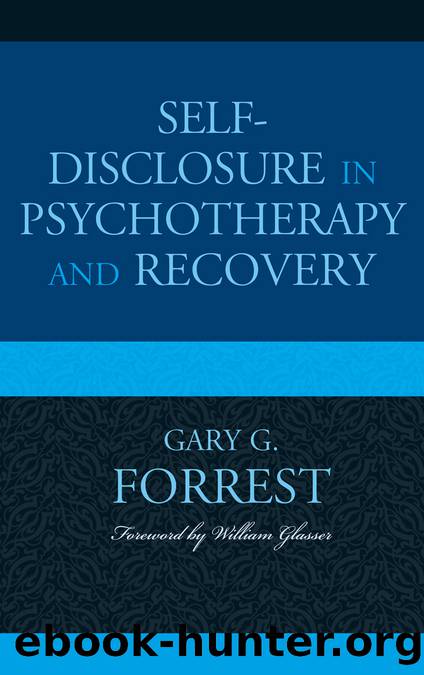Self-Disclosure in Psychotherapy and Recovery by Forrest Gary G.;

Author:Forrest, Gary G.;
Language: eng
Format: epub
ISBN: 9780765707284
Publisher: Jason Aronson, Inc.
Published: 2014-07-29T00:00:00+00:00
SUMMARY
The inability to self-disclose in a consistent, healthy, and optimal manner is a core psychological-interpersonal ingredient in the etiology of virtually all addictive disorders. The authorâs extensive experience pertaining to this aspect of the addiction process was examined early in this chapter. Most people who eventually recover or are ârecoveringâ from a diversity of addictive disorders develop a very obvious capacity for increased openness, authenticity, and self-disclosure. Case studies involving a compulsive gambler, compulsive overeater, and alcoholic were presented in the chapter. These case studies clearly demonstrate the importance and relevance of client self-disclosure to successful and unsuccessful treatment outcomes. Addicted and substance-abusing persons become progressively less capable of engaging in healthy self-disclosing behaviors as they enter the middle and later stages of the active addiction process. To the contrary, they begin to exude more frequent and healthy self-disclosing behaviors following treatment engagement and with sustained abstinence and recovery.
Self-help treatments (Alcoholics Anonymous, Narcotics Anonymous, Overeaters Anonymous, Gamblers Anonymous, etc.) also recognize the importance of honesty, openness, and self-disclosure in recovery. The recovery community has long emphasized the role and importance of self-disclosure in recovery. Each of the twelve steps of Alcoholics Anonymous (AA) and other related self-help approaches are examined in this chapter as they relate to self-disclosure in successful recovery from addictions. The self-help recovery community is also self-disclosure based. Other self-help oriented approaches to changing addictive behaviors (Rational Recovery, Moderation Management, Harm Reduction, Motivational Interviewing, etc.) also address and encompass various aspects of self-disclosure.
Finally, the relevance and importance of self-disclosure in recovery from a diversity of psychological problems and psychiatric disorders was discussed. Many people recover fully from anxiety disorders, depression, grief and loss, stress, sleep difficulties, and other psychological problems. Recoveries and partial recoveries (Bruni, 2006; Macphee, 2004; Adams, 2009) also occur among populations of persons who manifest very complicated and severe psychiatric disorders such as schizophrenia and bipolar illness. Case studies reflecting very significant growth and change as well as one tragic outcome among severely and chronically disturbed persons are also included in this chapter. Client self-disclosure and openness is essential to understanding and providing helpful and appropriate treatment interventions for persons who manifest the most severe and complicated psychiatric disorders.
In summary, self-disclosure plays a multiplicity of roles in the development of all addictive disorders as well as the recovery from addictive disorders, psychological problems, and psychiatric disorders. As noted throughout this chapter, client and therapist self-disclosures are also central to all treatment, recovery, and health care intervention models.
Download
This site does not store any files on its server. We only index and link to content provided by other sites. Please contact the content providers to delete copyright contents if any and email us, we'll remove relevant links or contents immediately.
Overcoming ADHD Without Medication : A Guidebook for Parents and Teachers by Children and Natural Psychology Association for Youth; Children The Association for Youth(749)
Out of the Mainstream: Helping the Children of Parents with a Mental Illness by Loshak Rosemary;(742)
Depression by Adams Media(690)
The Noom Mindset by Noom(516)
Delphi Collected Works of Sigmund Freud (Illustrated) by Sigmund Freud(495)
The Psychology of Media and Politics by George Comstock & Erica Scharrer(423)
MANIPULATION & MIND CONTROL: The Persuasion Collection: Dark Psychology Secrets, Analyze & Influence People with Nlp. How to learn Reading Friends and Develop Body Language Skills. by ROBERT TOWER(416)
The 48 Laws of Mental Power: Overcoming Trauma and Building Mental Strength by Victor O. Carl(378)
It's nobody's fault: new hope and help for difficult children and their parents by Harold Koplewicz(373)
Behold the Monster by Jillian Lauren(373)
Directions in Technical Writing and Communication by Gould Jay R.;(364)
The Hypnotic Coach: A Conversational Hypnotherapy Tool Kit by Marion Jess(360)
Sigmund Freud by Janet Sayers;(328)
THE PSYCHOLOGY OF ENTREPRENEURSHIP; New Perspectives by Michael M. Gielnik; Melissa S. Cardon; Michael Frese(316)
Positive Psychology Across the Lifespan; An Existential Perspective by Piers Worth(313)
Mastering Flow: Perform Better, Experience More Joy, and Live a Happier Life by Nils Salzgeber(309)
The Modern Young Man's Guide to Manhood by Wayne Walker(305)
Mind Hacking Secrets and Unlimited Memory Power: 2 Books in 1: Learn How to Improve Your Memory & Develop Fast, Clear Thinking in 2 Weeks + 42 Brain Training Techniques & Memory Improvement Exercises by Sharp Scott(302)
Secrets of the Autistic Millionaire: Everything I know about Autism, ASD, and Asperger's that I wish I'd known back then... by David William Plummer(287)
